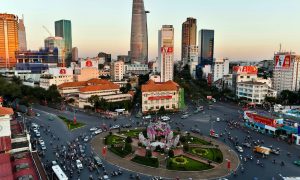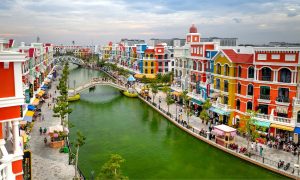In recent years, with the rise of telecommuting, more and moredigital nomad(Digital Nomads) choose to live and work around the world. Vietnam, with itsLow cost of living, beautiful natural environment, good internet infrastructure and friendly start-up atmospherethat is gradually becoming a popular destination for digital nomads around the world. However, for remote workers, how does VietnamLegal settlement, the availability of suitable visas and how to integrate into local life is a concern for many. This article will delve intoVietnam Immigration VisaCertificate Policy, Application Process and Guide to Life, helping remote workers to start their new journey in Vietnam smoothly.
I. Does Viet Nam have a specific "digital nomad visa"?
As of 2024, Vietnam has not yet launchedOfficial Digital Nomad Visa (DNV), but this does not mean that remote workers cannot live and work in Vietnam. Currently, digital nomads can work through a number ofVietnam Visaway to stay legally in Vietnam:
-
Business Visa (DN Visa) - For individuals entering Vietnam for business purposes, including remote workers.
-
Tourist Visa (DL Visa) - Applies to short-term stays, but does not allow for formal work.
-
Investment Visa (DT Visa) - For foreigners registering their companies in Vietnam, suitable for entrepreneurs who wish to stay for a long time.
-
Work Visa (LD Visa) - Applicable to expatriates holding employment contracts with Vietnamese companies.
-
Long-term Residence Visa (TRC) - For long-term residents who meet certain conditions, such as work, marriage or investment.
While Vietnam does not currently have a visa specifically for digital nomads, many remote workers choose toBusiness visa or long term tourist visaVietnam's Visa Run policy has been implemented in the past, and has been regularly renewed or traveled to neighboring countries for Visa Runs. However, as other countries in Southeast Asia (e.g., Thailand, Indonesia, etc.) are introducing specialized visas for digital nomads, Vietnam may also adjust its policy in the future.
II. How do digital nomads enter Vietnam legally?
1. Visa options for digital nomads
For remote workers, the following two visas are the most common:
-
Business Visa (DN Visa)::
-
population (esp. of a group of people): freelancers, remote workers, entrepreneurs, etc.
-
validity period: Usually 3 months, renewable.
-
How to apply: Through the Vietnamese embassies abroad or guaranteed by Vietnamese enterprises.
-
-
Tourist Visa (DL Visa)::
-
population (esp. of a group of people): Remote workers with short-term stays (not applicable to regular jobs).
-
validity period:: 1 to 3 months, renewable through a third-party agency or "visa run" to extend the stay.
-
How to apply: Electronic Visa (E-Visa) or Vietnam Embassy application.
-
2. Visa application process
The process of applying for a Vietnam visa is relatively simple and generally includes the following steps:
-
Choosing the right type of visa(Business visa or e-tourist visa is recommended).
-
Preparation of required documents::
-
Passport (valid for at least 6 months).
-
Application form (to be completed online or submitted by the embassy).
-
Visa fees (depending on the type of visa)
-
-
Submit an application::
-
E-visa available through VietnamimmigrantsApplications on the Bureau's website usually require3-5 working daysApproval.
-
Business visas can be applied for under the sponsorship of Vietnamese enterprises or visa agencies.
-
-
Entry into Vietnam: After entering the country with a visa, you can consider whether you need to renew or switch your visa type.
III. A guide to life as a digital nomad in Vietnam
1. Best cities for digital nomads
Several cities in Vietnam are suitable for remote workers to settle in, and here are some of the most popular destinations:
-
Ho Chi Minh City (HCMC)::
-
Vietnam's largest and most modern city with manyshared office space, cafes and business incubators.
-
Fast paced life for remote workers who enjoy the bustling city life.
-
-
Hanoi::
-
The cultural scene is rich in historical sites and French architecture.
-
Ideal for digital nomads who like a literary atmosphere and a slower pace of life.
-
-
Da Nang::
-
A resort town by the sea with a pleasant climate, numerous cafes and excellent internet facilities.
-
Ideal for remote workers who enjoy the beach, nature and a relaxing lifestyle.
-
-
Dalat::
2. Cost of living
Compared to western countries, the cost of living in Vietnam is very low. Below are the average prices of major living expenses in Vietnam (in Ho Chi Minh City, for example):
-
rent an apartment::
-
Apartment (city center): $500-$1000/month
-
Apartment (non-city center): $300-$600/month
-
-
foodstuffs::
-
Local restaurants: $2-$5/meal
-
Western food: $8-$20/meal
-
-
Internet costs::
-
Home Wi-Fi: $10-$20/month
-
4G traffic package: $5-$10/month
-
-
shared office space::

-
Monthly membership fee: $50-$200 (depending on location and facilities)
-
Overall, the monthly cost of living for a single teleworker is approximately **$800-$1500**, depending on lifestyle and location of residence.
3. Internet and telework
Vietnam ranks high among Southeast Asian countries in terms of Internet speed, with major cities in theHigh Wi-Fi coverage, many cafes, hotels and shared office spaces offer high speed internet. The following are recommendedshared office space::
-
WeWork (Ho Chi Minh City)
-
CirCO (Ho Chi Minh City)
-
Toong (Hanoi, Ho Chi Minh City)
-
Enouvo Space (Da Nang)
Recommended if a mobile network is requiredViettel, Mobifone or VinaphoneThe SIM card is cost-effective and has a wide range of coverage.
IV. Legal risks and considerations
Although many digital nomads live and work in Vietnam through tourist visas or business visas, the following legal risks need to be noted:
-
Tourist visas do not allow formal work: If they are found to be working locally, they may be fined or deported.
-
Avoiding prolonged "visa runs":: Although many teleworkers renew their tourist visas through regular trips to neighboring countries (e.g., Thailand, Cambodia), frequent "visa runs" may be a cause for concern for immigration authorities.
-
Tax issues: Under Vietnamese law, if you reside in Vietnam for more than 183 days, you may be subject to global income tax and are advised to consult a tax advisor.
V. Conclusion: Is Vietnam fit for digital nomads?
Although Vietnam has not yet launchedOfficial digital nomad visasBut withPleasant climate, low cost of living, well-developed internet infrastructure and a vibrant startup ecosystem, it remains an ideal choice for remote workers around the world. For digital nomads looking for a long-term place to live in Southeast Asia, Vietnam offers a variety of flexible visa options, while leaving open the possibility of future visa policy adjustments. If you're considering becoming aDigital nomads working remotely in VietnamIf you have a business or tourist visa, you may want to apply for a business or tourist visa first to experience the unique charms of this country!







